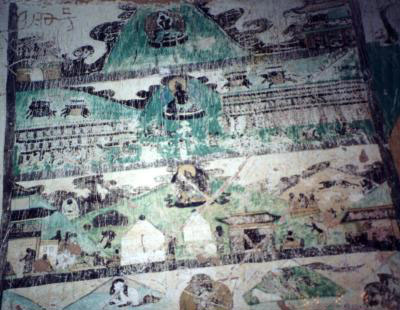| Tools: Save | Print | E-mail | Most Read |
| Ancient Fresco May Show Genghis Khan Funeral |
| Adjust font size: |
A fresco of a Mongolian funeral ceremony in Arjai Grotto in North China's Inner Mongolia Autonomous Region shows Genghis Khan (1167-1227), according to experts. The richly-decorated fresco in the 28th cave of Arjai Grotto is 50cm long and 35cm wide. It depicts a lavish Mongolian funeral of a man held above a grave in the beaks of four white cranes, said Pan Zhaodong, a researcher from the Social Science Academy of the Inner Mongolia Autonomous Region. A well-dressed onlooker near the ornate coffin might be the prince who accompanied Genghis Khan to annihilate the Western Xia regime 780 years ago while another two are monks, Zhang said. A monk on his knees appears to be praying to release the dead man's soul from purgatory, Zhao said. The woman crying in the palace in the left of the picture is his wife, Zhao said. But not everyone agrees with this view. Although the fresco accurately represents noble Mongolian funeral rites, the body may not be Genghis Khan, said Batujirghal, director of the Otog cultural relics protection center. The picture was nevertheless a very valuable icon that shows Mongolian attitudes towards death, dress and ritual, he said. Mongolian tents and palaces are also shown in the painting, he added. The four white cranes carrying the body to heaven express the Mongolian aspiration towards spiritual release, Batujirghal said. Genghis Khan, whose grandson Kublai Khan founded the Yuan Dynasty (1271-1368), unified Mongol tribes and conquered most of Eurasia. He was given the title "Genghis Khan" which means "universal ruler".
(Xinhua News Agency December 27, 2006) |
| Tools: Save | Print | E-mail | Most Read |
 |
| Related Stories |
